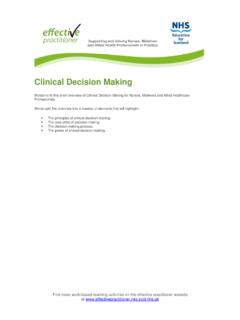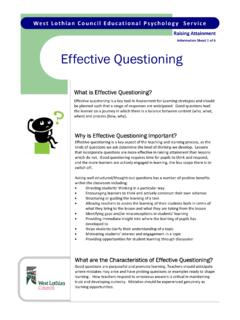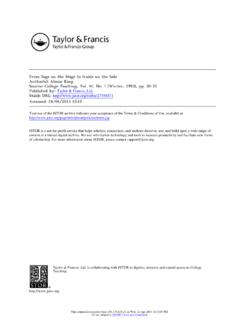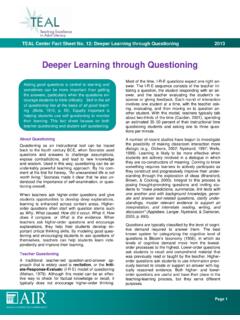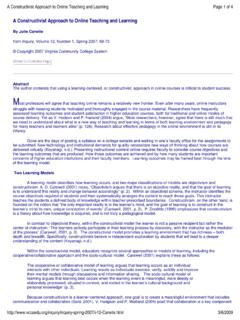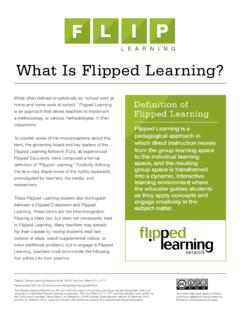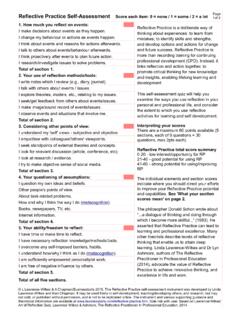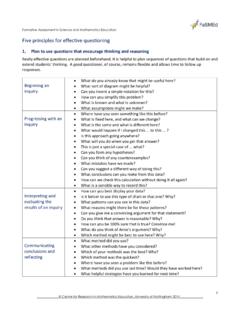Transcription of Learning in the Workplace - Effective Practitioner
1 Find more work-based Learning activities on the Effective Practitioner website at Learning in the Workplace Welcome to this short overview of Learning in the Workplace . We've split this overview into a number of elements that will highlight: Why you should undertake Learning in the Workplace and how it impacts person-centred, safe and Effective care. The different types of Learning opportunities in the Workplace and practical ways in which you can include Learning into your busy day-to-day practice. How you can record and evidence your Learning so that it can be used for your professional development. Find more work-based Learning activities on the Effective Practitioner website at What is Learning in the Workplace ? Do any of these statements ring true with you? If they do - then read on! An important part of being an Effective Practitioner is that you use and value your own day-to-day experiences to help you develop your clinical practice and support your continuing professional development.
2 Formal training has an important part to play as it provides a strong theoretical and practical foundation that you can use, refine and develop within your Workplace . However, it is the ongoing reflection on your practice, using for example the Learning activities contained in the Effective Practitioner website that will ensure that you keep yourself up-to-date and continue to deliver person-centred, safe and Effective care. There is a popular model of Learning called the 70/20/10 formula from Princeton University1that incorporates experiential Learning . It proposes: 70% of Learning and development takes place from real-life and on-the-job experiences, tasks and problem solving. 20% comes from feedback and from observing good and bad practices and working with role models. 10% of Learning and development comes from formal training.
3 "I'm too busy trying to get my job done, never mind trying to fit in Learning as well." "I've just completed a whole set of training days - I don't need any more development." "I prefer to be trained by a qualified practice educator - I don't believe it's possible to really learn anything new when I'm working" "I'm only recently qualified - no one would listen to any ideas I would have - I need to get a few years under my belt before trying to make any changes." "I constantly think about what I'm doing - I don't need to write anything down - I just get on with it and show others what I'm doing when I can" "What's the difference between Learning in the Workplace , on the job Learning and vocational Learning - is it just about Learning at work and not having to go to College?" Find more work-based Learning activities on the Effective Practitioner website at Effective Practitioner embraces the principles of the 70/20/10 model and the broader term of experiential learning2 and recognises that a large majority of what you learn can take place through reflection on your practice, asking for and receiving feedback and using your colleagues as role models.
4 Learning in the Workplace involves a number of core skills and activities. These include: Discussing your practice in an open and trusting way with colleagues and patients/clients. Listening to the views of others, particularly your patients/clients and observing what is happening in your environment. Reflecting on your own practice to see if, how and where you might improve on the care you are providing and optimising the way in which you work. questioning your own practice and questioning your colleagues so you can learn and develop together. questioning the role of others in the wider multidisciplinary team so you can develop a deeper knowledge and understanding of their role. Accessing information to allow you to make more informed decisions on improving your practice. Accessing help from others who can guide you in developing your practice.
5 Asking for and receiving feedback on your practice and using feedback to focus on specific areas of your practice. Giving feedback to your peers and colleagues in a supportive and constructive way. 1: Lombardo, Michael M. and Robert W. Eichinger (1996) The Career Architect Development Planner. Lominger Limited, Inc. p. iv. ISBN 0965571211. 2: Itin, C. M. (1999). Reasserting the Philosophy of Experiential Education as a Vehicle for Change in the 21st Century. The Journal of Experiential Education,.22(2), 91-98. Kolb, David A. 1984. Experiential Learning : Experience as the Source of Learning and Development. Prentice-Hall, Inc., Englewood Cliffs, Find more work-based Learning activities on the Effective Practitioner website at Why get involved? There are many good reasons to get actively involved in Learning in the Workplace : Enhancing Care: There can be significant Learning opportunities through taking part in practice developments clinical audits, getting involved in working groups to develop in your area of practice; participating in audits/surveys/research and using the findings to improve care; or developing Learning materials and clinical policies and procedures within your current Workplace .
6 KSF: Work-based activities can provide valuable evidence as part of your KSF review, as long as you evidence and record your Learning . Professional Development: A record of your work-based Learning activities can provide the necessary reassurance to your regulatory body that you are keeping your professional skills up to date. Learning in the Workplace goes beyond focusing on tasks within your current job - it is about developing your critical thinking and communication skills so that you can optimise what you are doing in your already busy schedule. It involves: critically thinking about the way you work so that you can be more efficient and improve the care that you and your colleagues are providing; valuing your own experience and having the confidence to suggest and document changes and contribute to the overall goals of your organisation/team; putting changes into practice and monitoring their effects over time so that you can continually learn and improve on what you are doing day-to-day; sharing your Learning with others so that each member of the team can work together, provide support and benefit from the Learning that you have undertaken.
7 Find more work-based Learning activities on the Effective Practitioner website at Opportunities to Learn There are a wide variety of ways in which you can undertake Learning in the Workplace . Learning in the Workplace doesn't need a lot of time. Even something as simple as asking how a patient or client feels about the care they are receiving may be valuable work-based Learning . It's what you do with this information that is important. Inside Current Workplace There are a wide variety of opportunities to learn within your current Workplace ; this list is not exhaustive. You should explore the range of opportunities available to you with your line manager. Critical Incident Analysis A critical incident is an event or incident that has had a significant impact on you, your colleagues or your patients. It is useful to consider why the incident has had an impact on you, alternative actions you might have taken and if you were faced with a similar situation in the future, how you would act.
8 Feedback from others It is useful to get feedback from a number of people you work with including colleagues, patients, carers and families. They can give you honest and objective information to help you improve for example the care you provide or your communication skills. In addition, there may be an opportunity to do a more formal 360 feedback where a standard set of questions are completed by your line manager, colleagues, patients/clients or other individuals that you work with. KSF Reviews and Personal development planning KSF Reviews and personal development planning can identify your strengths and development gaps. Put a practical plan in place with goals and target dates to address your development gaps for your current role or your career aspirations. You can also share your strengths with others to support the development needs of peers.
9 Peer Review Peer review involves you working with colleagues at the same level and evaluating each other's performance in a constructive way. Find more work-based Learning activities on the Effective Practitioner website at Practice Development There can be significant Learning opportunities through taking part in clinical audits, getting involved in working groups in your area of practice or developing clinical policies within your current Workplace . Reflection in Practice Reflection in practice is a process where you take time to reflect on for example a single event or the events over a day to examine what happened, what was good or bad about the experience, what else you could have done, and what you would change or improve in your practice as a result of this Learning . Outside Current Workplace There are a wide variety of opportunities to learn outside your current Workplace ; this list is not exhaustive.
10 You should explore the range of opportunities available to you with your line manager. Action Learning Action Learning involves a small group of practitioners (the 'set') working together on issues or problems that are real and current in their Workplace . Group members will share their problems, with other constructive questioning , challenging assumptions and views and sharing their own experiences. The purpose of the activity is to gain new understanding and actions to address the problem and improve practice and care. Members will give feedback to the group on what actions worked and didn't work. An Action Learning set can be guided by a Learning set facilitator or can be group-directed. Job Shadowing Job Shadowing helps you to gain useful insights and a greater understanding into other people's jobs by observing their daily practice and asking lots of questions in person.

